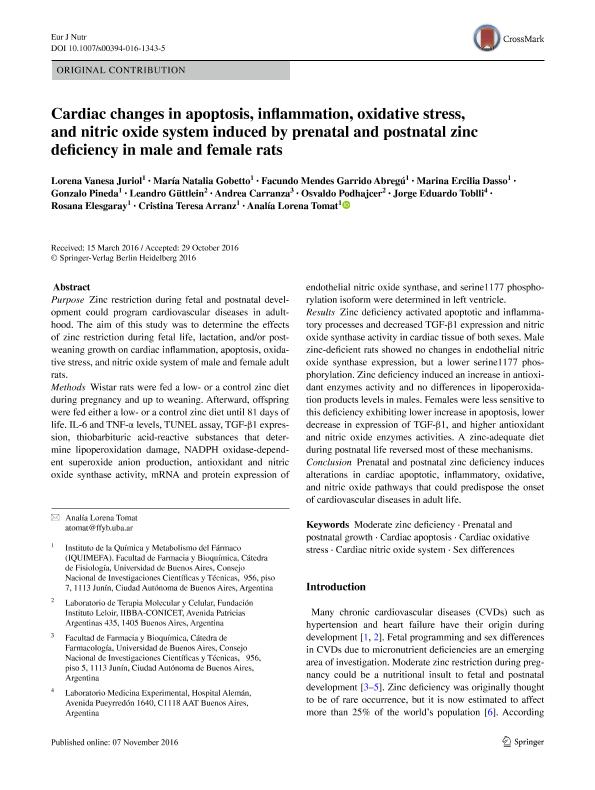Artículo
Cardiac changes in apoptosis, inflammation, oxidative stress, and nitric oxide system induced by prenatal and postnatal zinc deficiency in male and female rats
Juriol, Lorena Vanesa ; Gobetto, María Natalia
; Gobetto, María Natalia ; Mendes Garrido Abregú, Facundo
; Mendes Garrido Abregú, Facundo ; Dasso, Marina Ercilia; Pineda, Gonzalo Ezequiel
; Dasso, Marina Ercilia; Pineda, Gonzalo Ezequiel ; Güttlein, Leandro
; Güttlein, Leandro ; Carranza, Maria Andrea
; Carranza, Maria Andrea ; Podhajcer, Osvaldo Luis
; Podhajcer, Osvaldo Luis ; Toblli, Jorge Eduardo
; Toblli, Jorge Eduardo ; Elesgaray, Rosana
; Elesgaray, Rosana ; Arranz, Cristina Teresa
; Arranz, Cristina Teresa ; Tomat, Analia Lorena
; Tomat, Analia Lorena
 ; Gobetto, María Natalia
; Gobetto, María Natalia ; Mendes Garrido Abregú, Facundo
; Mendes Garrido Abregú, Facundo ; Dasso, Marina Ercilia; Pineda, Gonzalo Ezequiel
; Dasso, Marina Ercilia; Pineda, Gonzalo Ezequiel ; Güttlein, Leandro
; Güttlein, Leandro ; Carranza, Maria Andrea
; Carranza, Maria Andrea ; Podhajcer, Osvaldo Luis
; Podhajcer, Osvaldo Luis ; Toblli, Jorge Eduardo
; Toblli, Jorge Eduardo ; Elesgaray, Rosana
; Elesgaray, Rosana ; Arranz, Cristina Teresa
; Arranz, Cristina Teresa ; Tomat, Analia Lorena
; Tomat, Analia Lorena
Fecha de publicación:
11/2016
Editorial:
Springer
Revista:
European Journal of Nutrition
ISSN:
1436-6207
e-ISSN:
1435-1293
Idioma:
Inglés
Tipo de recurso:
Artículo publicado
Clasificación temática:
Resumen
Purpose: Zinc restriction during fetal and postnatal development could program cardiovascular diseases in adulthood. The aim of this study was to determine the effects of zinc restriction during fetal life, lactation, and/or post-weaning growth on cardiac inflammation, apoptosis, oxidative stress, and nitric oxide system of male and female adult rats.
Methods: Wistar rats were fed a low- or a control zinc diet during pregnancy and up to weaning. Afterward, offspring were fed either a low- or a control zinc diet until 81 days of life. IL-6 and TNF-α levels, TUNEL assay, TGF-β1 expression, thiobarbituric acid-reactive substances that determine lipoperoxidation damage, NADPH oxidase-dependent superoxide anion production, antioxidant and nitric oxide synthase activity, mRNA and protein expression of endothelial nitric oxide synthase, and serine1177 phosphorylation isoform were determined in left ventricle.
Results: Zinc deficiency activated apoptotic and inflammatory processes and decreased TGF-β1 expression and nitric oxide synthase activity in cardiac tissue of both sexes. Male zinc-deficient rats showed no changes in endothelial nitric oxide synthase expression, but a lower serine1177 phosphorylation. Zinc deficiency induced an increase in antioxidant enzymes activity and no differences in lipoperoxidation products levels in males. Females were less sensitive to this deficiency exhibiting lower increase in apoptosis, lower decrease in expression of TGF-β1, and higher antioxidant and nitric oxide enzymes activities. A zinc-adequate diet during postnatal life reversed most of these mechanisms.
Conclusion: Prenatal and postnatal zinc deficiency induces alterations in cardiac apoptotic, inflammatory, oxidative, and nitric oxide pathways that could predispose the onset of cardiovascular diseases in adult life.
Archivos asociados
Licencia
Identificadores
Colecciones
Articulos(IIBBA)
Articulos de INST.DE INVEST.BIOQUIMICAS DE BS.AS(I)
Articulos de INST.DE INVEST.BIOQUIMICAS DE BS.AS(I)
Articulos(IMEX)
Articulos de INST.DE MEDICINA EXPERIMENTAL
Articulos de INST.DE MEDICINA EXPERIMENTAL
Articulos(ININCA)
Articulos de INST.DE INVEST.CARDIOLOGICAS (I)
Articulos de INST.DE INVEST.CARDIOLOGICAS (I)
Articulos(IQUIMEFA)
Articulos de INST.QUIMICA Y METABOLISMO DEL FARMACO (I)
Articulos de INST.QUIMICA Y METABOLISMO DEL FARMACO (I)
Citación
Juriol, Lorena Vanesa; Gobetto, María Natalia; Mendes Garrido Abregú, Facundo; Dasso, Marina Ercilia; Pineda, Gonzalo Ezequiel; et al.; Cardiac changes in apoptosis, inflammation, oxidative stress, and nitric oxide system induced by prenatal and postnatal zinc deficiency in male and female rats; Springer; European Journal of Nutrition; 2016; 11-2016; 1-15
Compartir
Altmétricas



